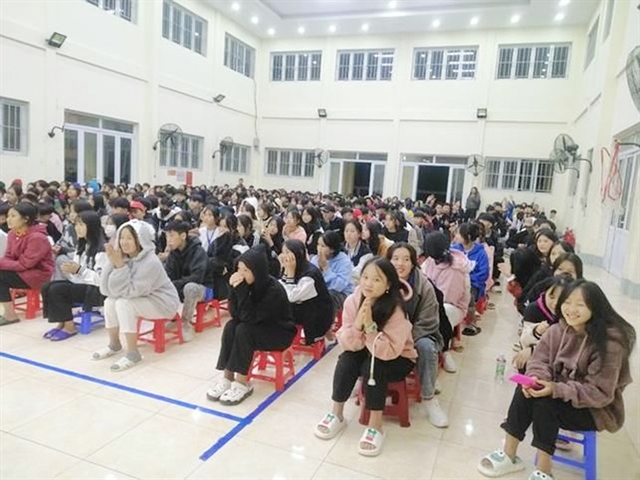 Society
Society

 |
| Đồng Văn Middle School and High School for Ethnic Minority Boarding Students in Hà Giang Province. Photo giaoduc.net.vn |
HÀ NỘI — Despite the Government's policies in education development in remote, isolated and ethnic minority areas., some have been applied for a long time and are no longer appropriate.
With no updated policies brought into to replace them, it is difficult for many schools to take care of students.
According to Lý Xuân Tiến - Vice Principal of Bắc Mê Middle School and High School for Ethnic Minority Boarding Students (Hà Giang), there are currently 386 boarding students, 250 in the middle school and 136 in the high school.
“With the support of VNĐ1,192,000/student per month (US$49), compared to current prices, it is not enough to meet their basic needs. In particular, the balance between the nutritional quality of the children's meals and the support budget is a headache for teachers,” he said.
Tiến said that the distribution of supplies for students is only carried out in the first year of each school level, and in the following years, students will only receive a partial supplement. After the first year, many students lack items but are not supplemented enough, leading to difficulties in learning and living.
The lack of finance to maintain the school's operation also comes from the fact that funds are also used to pay salaries for non-payroll positions, such as cooks and guards.
Another inadequacy policy is the allocation of human resources to schools.
Sharing her opinion about this issue, Mua Thị Hồng Minh – Principal of Đồng Văn Middle School and High School for Ethnic Minority Boarding Students (Hà Giang) said: "According to regulations, each ethnic minority high school can only have two vice principals.
“Currently, both vice principals of Đồng Văn Middle School and High School for Ethnic Minority Boarding Students are in charge of expertise (one in charge of the middle school, one in charge of the high school). There is no vice principal in charge of boarding work so we have to assign more work to the vice principals, leading to increased pressure.”
Regarding textbooks, as a rule, textbooks are for shared and long-term use. Every year, the school can only purchase additional textbooks equal to 10 per cent of the total books in shared bookshelves. However, in the context of implementing the educational reform programme, each subject and scholarly activity in a grade class chooses one or several different textbooks, so it will be difficult for schools to provide enough.
Some other activities for students also need funding, such as visiting home for the Lunar New Year, while cultural and sports activities are currently only supported at a deficient level, not enough to ensure quality.
Notably, expenses such as hot water for students in highland areas when it is freezing, repair costs, etc., are minimal. The teachers must try their best to ensure enough for the students.
It is hoped that in the future, interdisciplinary agencies will have policies to remove difficulties for boarding school students. — VNS



